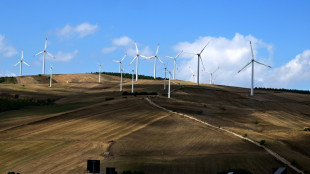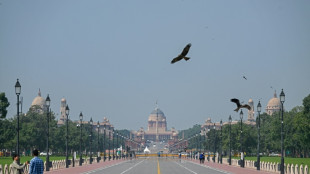
-
 Snowstorm blankets US northeast as New York sees travel ban
Snowstorm blankets US northeast as New York sees travel ban
-
Healthcare crisis looms over Greenland's isolated villages

-
 Hodgkinson says breaking 800m record would put her among athletics' greatest
Hodgkinson says breaking 800m record would put her among athletics' greatest
-
Two Russian security personnel were on board France-seized tanker: sources

-
 EU puts US trade deal on ice after Supreme Court ruling
EU puts US trade deal on ice after Supreme Court ruling
-
Hetmyer blasts 85 as West Indies pile up 254-6 against Zimbabwe

-
 Canada PM heads to Asia seeking new trade partners as US ties fray
Canada PM heads to Asia seeking new trade partners as US ties fray
-
South Africa accepts Trump's new US ambassador

-
 Iraq's Maliki defends PM candidacy, seeks to reassure US
Iraq's Maliki defends PM candidacy, seeks to reassure US
-
UEFA suspend Benfica's Prestianni after alleged racist abuse

-
 Jetten sworn in as youngest-ever Dutch PM
Jetten sworn in as youngest-ever Dutch PM
-
Italy's Enel to invest 20bn euros in renewables by 2028

-
 BBC apologises for 'involuntary' Tourette's racial slur during BAFTA awards
BBC apologises for 'involuntary' Tourette's racial slur during BAFTA awards
-
Kristen Bell returns to host glitzy Actor Awards in Hollywood

-
 Iran says would respond 'ferociously' to any US attack
Iran says would respond 'ferociously' to any US attack
-
Venezuelan foreign minister demands 'immediate release' of Maduro

-
 Dane Vingegaard to start season at Paris-Nice in March
Dane Vingegaard to start season at Paris-Nice in March
-
Australia PM backs removing UK's Andrew from line of succession

-
 Where do Ukraine and Russia stand after four years of war?
Where do Ukraine and Russia stand after four years of war?
-
Police investigating racist abuse of Premier League quartet

-
 Fiji to start Nations Championship at 'home' to Wales in Cardiff
Fiji to start Nations Championship at 'home' to Wales in Cardiff
-
EU lawmakers to put US trade deal on hold after Supreme Court ruling

-
 Rubio to attend Caribbean summit as US presses Venezuela, Cuba
Rubio to attend Caribbean summit as US presses Venezuela, Cuba
-
'Ugly' England aim to spin their way to T20 World Cup semi-finals

-
 Nigeria paid Boko Haram ransom for kidnapped pupils: intel sources
Nigeria paid Boko Haram ransom for kidnapped pupils: intel sources
-
Tudor says Tottenham can still beat the drop despite Arsenal loss

-
 Violence sweeps Mexico after most-wanted drug cartel leader killed
Violence sweeps Mexico after most-wanted drug cartel leader killed
-
France giant Meafou capable of being 'world's best' lock

-
 Stocks diverge, dollar down over Trump tariffs uncertainty
Stocks diverge, dollar down over Trump tariffs uncertainty
-
World champions South Africa announce eight home Tests for 2026/27

-
 Liverpool boss Slot encouraged by Mac Allister's return to form
Liverpool boss Slot encouraged by Mac Allister's return to form
-
India replaces British architect statue with independence hero

-
 Pakistan warn England's flaky batting to expect a trial by spin
Pakistan warn England's flaky batting to expect a trial by spin
-
Philippines' Duterte authorised murders, ICC told as hearings open

-
 Iran says would respond 'ferociously' to any US attack, even limited strikes
Iran says would respond 'ferociously' to any US attack, even limited strikes
-
New Dutch government sworn in under centrist Jetten

-
 What the future holds for the CJNG cartel after leader killed
What the future holds for the CJNG cartel after leader killed
-
ICC kicks off pre-trial hearing over Philippines' Duterte

-
 UN chief decries global rise of 'rule of force'
UN chief decries global rise of 'rule of force'
-
Nemesio Oseguera, the brutal Mexican drug lord known as 'El Mencho'

-
 Senegal's Sahad, radiant champion of 'musical pan-Africanism'
Senegal's Sahad, radiant champion of 'musical pan-Africanism'
-
New York orders citywide travel ban as major storm hits US

-
 'Considered a traitor': Life of an anti-war Ukrainian in Russia
'Considered a traitor': Life of an anti-war Ukrainian in Russia
-
South Korea and Brazil sign deals on K-beauty, trade

-
 Zimbabwe farmers seek US help over long-promised payouts
Zimbabwe farmers seek US help over long-promised payouts
-
Hong Kong appeals court upholds jailing of 12 democracy campaigners

-
 India battle for World Cup survival after 'messing up on grand scale'
India battle for World Cup survival after 'messing up on grand scale'
-
'I will go': Bengalis in Pakistan hope for family reunions

-
 North Korea touts nuclear advances as Kim re-chosen to lead ruling party
North Korea touts nuclear advances as Kim re-chosen to lead ruling party
-
South Korea protests 'Victory' banner hung from Russian embassy


Dozens of SpaceX internet satellites lost to geomagnetic storm
Up to 40 SpaceX high-speed internet satellites have been knocked out of orbit by a geomagnetic storm shortly after launch, but pose little threat to Earth as they burn up in the atmosphere, the company said.
Geomagnetic storms are caused by ejections of the solar corona into space, resulting in disturbances to the Earth's upper atmosphere and increased drag on objects in low orbits.
The latest 49 satellites from the Starlink network launched from the Kennedy Space Center in Florida on February 3 and successfully assumed their initial orbit, with their nearest approach to the surface 130 miles (210 kilometers) high.
The company places them into this region to carry out final checks before flying further into space.
On February 4, however, they were struck by the space weather event, Elon Musk's company said in a statement late Tuesday.
"These storms cause the atmosphere to warm and atmospheric density at our low deployment altitudes to increase. In fact, onboard GPS suggests the escalation speed and severity of the storm caused atmospheric drag to increase up to 50 percent higher than during previous launches," it said.
The Starlink team commanded the satellites into a safe mode, where they would fly edge-on -- like a sheet of paper -- to minimize drag as they sought shelter.
But despite the evasive maneuver, most were unable to raise their orbits, and as many as 40 "will reenter or already have reentered the Earth's atmosphere."
The company insisted they posed "zero collision risk" with other satellites and are designed to disintegrate upon re-entry, with no debris expected to hit the ground.
The UK Space Agency agreed in a blog post that there was "virtually no risk" since the satellites are built without any dense metallic components and should burn up entirely, but said it was monitoring closely. NASA has not yet commented.
Apart from increasing atmospheric drag, geomagnetic storms can wreak havoc with satellites' computer circuitry and thus cause them to fail, according to space industry analyst Seradata.
Whatever the exact cause, the loss could point to a design weakness in Starlink satellites' ability to withstand such storms, Seradata's David Todd wrote in a post.
But it is not expected to impact the overall functioning of the Starlink "constellation."
SpaceX has launched more than 2,000 of the satellites since May 2019, with more than 1,500 currently operational, providing internet coverage across most of the planet.
The company currently has regulatory approval for 12,000 satellites, with plans to expand even further.
Astronomers have raised concerns about their impact on ground-based astronomy as they add to a congested environment in Low Earth Orbit (LEO).
There are approximately 4,000 active satellites in this space, which extends to 1,200 miles above the surface, as well as 15,000 pieces of debris like rocket bodies and defunct probes, according to the UK Space Agency.
W.Mansour--SF-PST



